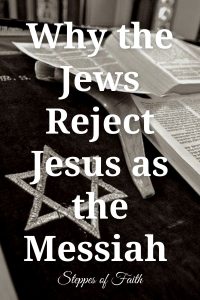
“Blessed is He who comes in the name of the Lord.” Psalm 118:26
For centuries, the Jewish people have rejected Jesus of Nazareth as the promised Messiah despite overwhelming biblical prophecy. Many Christians may find it difficult to understand why. The Jews’ beliefs are usually not personal. Instead, they are based on what has been taught by a long line of rabbis and sages, who rely on the Torah and religious commentaries called Mishnah for what they perceive to be the truth.
So, what are the reasons why the Jews reject Jesus, that He is the Messiah and Son of God? For Christians to understand, we must look at Jewish cultural history and what the rabbis are teaching.
Messiah Criteria
While there is little direct evidence of Jesus’ existence, archaeologists and scholars alike agree He did indeed exist. They agree He was born sometime around 6 or 4 B.C. while the Romans occupied Israel during Pontius Pilate’s governance.
The Jewish people were under tremendous tension during Jesus’ lifetime. The Romans controlled every aspect of daily living, and the Jews often struggled with the Pharisees over Torah interpretation. Such uncertainty made the Jews yearn for freedom in every sense. They yearned to be rid of the Romans and to have national sovereignty. And, to them, the only way to get it was for the Messiah to come.
The Jews mainly understood who the Messiah would be by Old Testament (specifically, Tanakh) prophecy. They declared there were specific criteria He must meet to prove Himself. He must:
- Build the Third Temple (Ezekiel 37:26-28).
- Gather all Jews, including the original ten tribes, back to the land of Israel (Isaiah 43:5-6).
- Usher in an era of world peace and end all hatred, oppression, suffering, and disease. “Nation shall not lift up sword against nation, neither shall man learn war anymore (Isaiah 2:4).”
- Spread universal knowledge of the God of Israel, which will unite humanity as one. “God will be King over all the world – on that day, God will be One, and His Name will be One (Zechariah 14:9).”
By the first century, Jewish views also held there would be a general resurrection of the dead and a final judgment. Later, the medieval sage Maimonides wrote in his Mishnah Torah, adding to the previous requirements. He stated the Messiah must also restore the kingdom of David to its former glory and be victorious against all of Israel’s enemies. “And if he’s not successful with this, or if he is killed, it’s known that he is not the one that was promised by the Torah,” Maimonides wrote.
Maimonides also described Jesus as the failed Messiah (who, in actuality, will be the antichrist) foreseen by the prophet Daniel. Rather than redeeming Israel, Maimonides writes, Jesus caused Jews to be killed and exiled, changed the Torah, and led the world to worship a false god.
Examples of Jewish Reasoning
Anyone who failed to perform all the above criteria could not possibly be the Messiah in the Jewish mind. For example, they often point out Jesus’ words in Luke 12:53 as the reason He could not bring universal peace.
“Father will be divided against son and son against father, mother against daughter and daughter against mother, mother-in-law against her daughter-in-law and daughter-in-law against her mother-in-law.”
The Jews fail to understand Jesus’s words correctly. What He is talking about here in Luke 12:53 are the potential consequences for anyone who chooses to follow Him. Family members might reject you, and there could be ongoing family conflict. Still, the Jews maintain that Jesus was promoting violence and not peace.
Jewish people also occasionally point to the New Testament Gospels, which clearly show Jesus did not fit these requirements in His lifetime. Christians usually counter that Jesus will fulfill them when He returns for His bride, the church, as the book of Revelation states. Unfortunately, however, many Jews claim no such prophecy of a second coming exists.
Commentaries in the Jewish Talmud, the primary source of Jewish law and theology, refer to Messianic prophecy in Isaiah 53 and Psalm 22. But when the early Christians used these commentaries (such as Jesus as the “suffering servant”) to support their claims that Jesus is the Messiah, the Jews backpedaled and said the commentaries actually referred to Israel, not Christ.

Rejecting Prophecy
Other Jewish writings also reject that Jesus could be the Messiah. According to the Talmud, the Messiah would be the greatest prophet the world had ever seen.
“The Spirit of the LORD shall rest upon Him, the Spirit of wisdom and understanding, the Spirit of counsel and might, the Spirit of knowledge and of the fear of the LORD.” Isaiah 11:2
Many Jews believe prophecy cannot exist without a majority of the world’s Jews inhabiting Israel, something that has not happened since the Babylonians conquered Israel in 597 B.C. Therefore, since the Old Testament prophets all died 350 years before Jesus, and the Jews remain scattered, Jesus cannot be the Messiah.
We can then imagine the shock and offense the Jewish leaders felt when Jesus opened the book of Isaiah in a synagogue in Nazareth and read, “The Spirit of the LORD is upon Me (Luke 4:18).” And after He finished reading, He sat down and said, “Today this Scripture is fulfilled in your hearing (v21).”
This did not go over well. Those in the synagogue grabbed Jesus and forced Him to the top of a cliff with the intent of throwing Him over to His death. But Jesus miraculously passed “through the midst of them (Luke 4:30)” without their notice.
Though stunned by Jesus’ amazing escape, the Jews felt Jesus did not receive the justice He deserved. So they hardened their hearts and made up their minds—Jesus was not the Messiah. In fact, He was blasphemous.
Jesus’ Proper Bloodline
The Jewish faith also fully rejects the idea that Jesus was born of a virgin. Such a miraculous birth would mean He had no earthly father. Jewish tradition holds that a family’s bloodline must come through the father’s side of the family. So if there is no earthly father, there cannot be a bloodline. Further, the Old Testament says the Messiah would be a descendant of King David. But if there is no bloodline, Jesus cannot be a descendant of David or anyone else.
Matthew 1:1-17 is often used as proof of Jesus’ bloodline, that He did indeed descend from the family of King David. But the Jews also reject this ancestry, pointing out inconsistencies in the lineage because of King Jeconiah (also known as Jehoiachin), who was one of the last kings on Judah’s throne before the Babylonians conquered Israel (2 Kings 24:8-12). Jeconiah, a descendant of King David, “did evil in the sight of the LORD,” and so he was forever cursed by God as the prophet Jeremiah describes.
“Thus says the LORD: Write this man down as childless, a man who shall not prosper in his days; for none of his descendants shall prosper, sitting on the throne of David and ruling anymore in Judah.” Jeremiah 22:30
Since God cursed Jeconiah never to have descendants, Jesus could not possibly have come from the line of David. That’s where the Gospel of Luke comes in.
Luke describes Mary’s side of the family in chapter three, verses 23-38. She was a descendant of King David. But since a Jewish ancestry only comes from the father’s side, it is irrelevant. And so, Jesus is not the Messiah.
Jesus’ miraculous birth by the power of the Holy Spirit is also categorically rejected. For a mortal woman to be impregnated by a god is considered a first-century pagan idea. According to Judaism, the Messiah is supposed to be fully human, born of human parents, and possess typical physical attributes (the latter perhaps inspired by Isaiah 53:2). He will not be able to perform anything supernatural or be a demi-god.
Ironically and thankfully, Jesus did not fit these criteria either.

Jesus and the Torah
Many Jews also believe Jesus did not keep the Torah. Some believe Jesus declared certain forbidden foods “clean” in Mark 7:19. But again, this Scripture is taken out of context. Here, Jesus is explaining to the disciples it is not food that defiles a person; It is what comes out of a person’s heart.
“Do you not perceive that whatever enters a man from outside cannot defile him because it does not enter his heart but his stomach, and it is eliminated, thus purifying all foods? What comes out of a man, that defiles a man. For from within, out of the heart of men, proceed evil thoughts, adulteries, fornications, murders, thefts, lewdness, an evil eye, blasphemy, pride, foolishness. All these evil things come from within and defile a man.” Mark 7:18-20
Jesus did not overturn kosher dietary laws. He was simply making a point about where evil originates.
The Jews also argue He cannot be the Messiah because He performed work on the Sabbath; thus, He again did not keep the Torah. They further claim He said Old Testament commandments no longer needed to be kept, but there is no basis for this. Still, they point to John 9:14, where Jesus spits into the dirt and makes a paste to put on a blind man’s eye to give him sight.
They also point out Matthew 12:1 and Mark 2:23, where Jesus and the disciples were walking through a wheat field on a Sabbath day. The disciples were hungry, so they picked off the heads of grain to eat. The Pharisees were enraged, but Jesus reminds them that even priests work on the Sabbath and some aspects of the Sabbath are simply ceremonial. Like the Pharisees, the Jews believe Jesus does not keep the Torah, especially on the Sabbath.
False Christian Teachers
False Christian teachings did not help matters.
For many years, certain Christian leaders taught that God had rejected the Jews for not recognizing Jesus as the Son of God. They also accused the Jews of killing Him, citing when Pilate washed his hands following the Jews’ cry to crucify Jesus.
“‘ I am innocent of the blood of this just Person. You see to it.’ And all the people answered and said, ‘His blood be on us and on our children.'” Matthew 27:24-25
Though the Jews assembled at Jesus’ judgment appear to accept responsibility for His death, it is important to note scholars largely believe the people were either the Pharisees’ “hired help” or innocent citizens who were caught up in the emotion of the moment. It is not believed the entire Jewish population in any way crucified Jesus.
Still, Christian leaders promoted the view the Jewish people were responsible, including Saint Augustine, who wrote, “Jews have been scattered throughout all nations as witnesses to their own sin and to our truth.… Scatter them abroad, take away their strength. And bring them down, O Lord.”
Even the Protestant Reformer Martin Luther called for the destruction of German Jews: “First, set fire to their synagogues.… Second, I advise that their houses also be razed and destroyed.”
Other horrible stories exist of Nazi guards brutally beating Jews and claiming Jesus told them to do it. Such rhetoric continues to fan the flames of anti-Semitism that blames every atrocity the Jews ever suffered on themselves the day they killed Jesus. Jesus never would condone such evil behavior.
Taken together with the unfulfilled Messiah criteria, it is no wonder the Jews reject Jesus in particular and Christianity as a whole.

Yeshu or Yeshua?
It is also not helpful that rabbis fail to see how Isaiah 44:6 has been corrupted by a third-century Palestinian rabbi named Abbahu.
“I am the First, and I am the Last; Besides Me, there is no God.”
Rabbi Abbahu changed Isaiah’s words to, “‘ I am the first,’ for I have no father; ‘and I am the last,’ for I have no son, ‘and beside Me, there is no God,’ for I have no brother.” The doctrine of the Trinity did not emerge until a later time. Still, no one has bothered to correct this portion of Scripture in the Talmud.
As a result, people are taught at a young age that Jesus is Yeshu, a Hebrew acronym for “yimakh shemo ve zikhro,” which means “May his name and memory be obliterated.” Many Jews also call Him Yeshu haNotzri, which means “curses on Jesus-the-Christian,” even though Jesus was never a Christian. He is the Christ. Interestingly, though, while Notzri means “Christian” in Hebrew, it actually means “one from Nazareth.”
It seems only Jewish academics recognize that Jesus is not Yeshu but Yeshua. The extra “a” at the end, called an “ayin,” means “eye” in Hebrew. As one Bible teacher commented, “It’s almost as if without the “ayin” they cannot see, but when the “ayin” is added, sight comes to the blind.”
Ironically, Yeshua is a version of Joshua, which means “salvation.” It is a name that is common in Jewish history (1 Chronicles 24:11, 2 Chronicles 31:15, Ezra 2:2,6,36).
And concerning the Greek language, “Khristos” is the Greek word for Messiah. So “Jesus Christ” actually translates to “Yeshua the Messiah” or “salvation of God.”

A Reason for Hope
Regretfully, the Jews have endured so much suffering at the hands of men who think they are acting in the name of Jesus that He has become their enemy. As a result, they overwhelmingly reject Christianity and Jesus as the promised Messiah.
But bad Christians are not entirely at fault.
Rabbis and false teachers have actively encouraged a rejection of Jesus. Their hate for Him has been taught and passed down through multiple generations and has blinded millions of Jews from seeing what is right before their eyes: Jesus is Yeshua, the One who opens blind eyes, the One who saves. He is Christ, the Messiah. Thankfully, an increasing number of Jews are beginning to realize it.
According to Jews for Jesus, a Barna study of Jewish Millennials was carried out in 2017. The study found that 20% of Jewish Millennials surveyed responded that Jesus was “God in human form who lived among people in the 1st century.” Such a statistic indicates emerging generations of young Jews are deciding for themselves who Jesus is.
These young people more and more recognize that Jesus had Jewish parents, was raised in a Jewish home in Israel, fully observed the Torah, and was a fully trained rabbi. His teachings were not an attack on Judaism but rather an authoritative, intelligent interpretation of the Torah and a critique of a corrupt religious system during his day. They understand His teachings are simply a continuation of Judaism and not an abandonment or replacement of it.
The God of Israel has always been faithful to keep a remnant of believing Jews to Himself. In the United States alone, some estimates say that there are over 100,000 Jewish believers in Jesus, and the numbers are growing all the time. But until all Jews can say, “Blessed is He who comes in the name of the Lord (Matthew 23:39),” Jesus’ return is a long way off.
Please pray for our Jewish brothers and sisters to see the truth, that Jesus is Yeshua, the promised Messiah.

Presence!
Ok, hi. So, first of all, I’m Jewish, and I have NEVER met a Jew who hated Jesus. Second of all, of anyone does hate Jesus, the only ones to blame are the Christians of old who persecuted us. If anything, this article just reminded me of all the reasons I believe Jesus wasn’t the messiah. But these are just my opinions. Have a blessed day.
I don’t believe anyone said the Jews hate Jesus. They simply don’t agree that He is the Messiah. Nevertheless, thank you for reading. I highly suggest Rabbi Jason Sobel’s book, “Mysteries of the Messiah.” He does a good job of connecting Torah and all of the Hebrew Bible to the New Testament and how Christianity has its roots in Judaism. Perhaps it will help answer some questions you may have. May the Lord bless you and keep you.
This was a great read! I often think that we have been mislead, not just Jews but Christians and how we approach Christianity. I noticed at my own church that there’s a bit of hostility taught when it comes to dealing with non-Christians or those who “sin”. Some people weigh certain sins more than others based on their personal values. I really wish sermons could be more like this. Explaining the partial fault in our on community because we are far from perfect, but also encourage hope amongst all people. Once again, I really enjoyed reading this. I have a deep urge to know Jesus so I read a lot, I’m glad God brought me to this!
Thank you so much for your kind words. Yes, the Christian community must acknowledge its own sins if the church is going to stay pure. In the meantime, please pray for our Jewish brothers and sisters that their eyes would open. Though they are God’s chosen people, sadly, many of them will never see heaven.